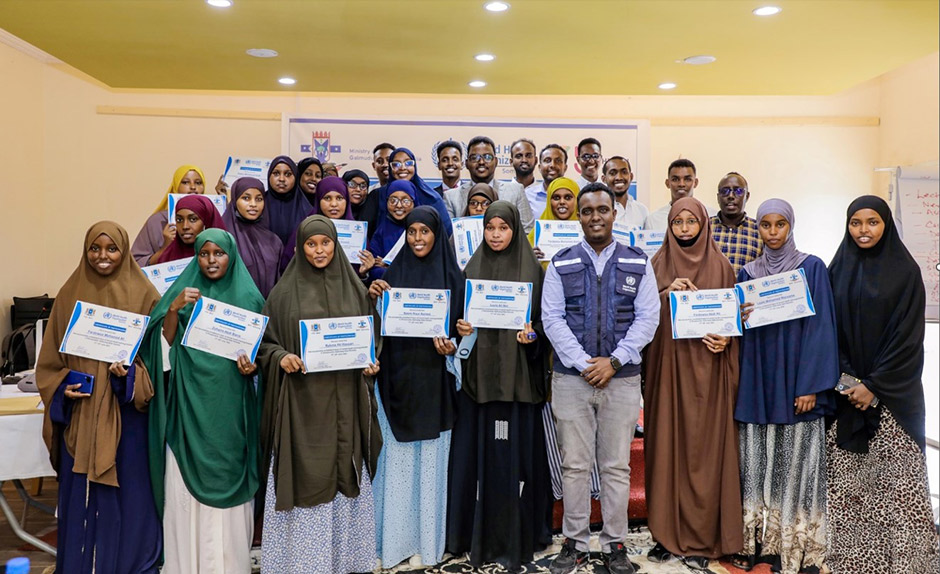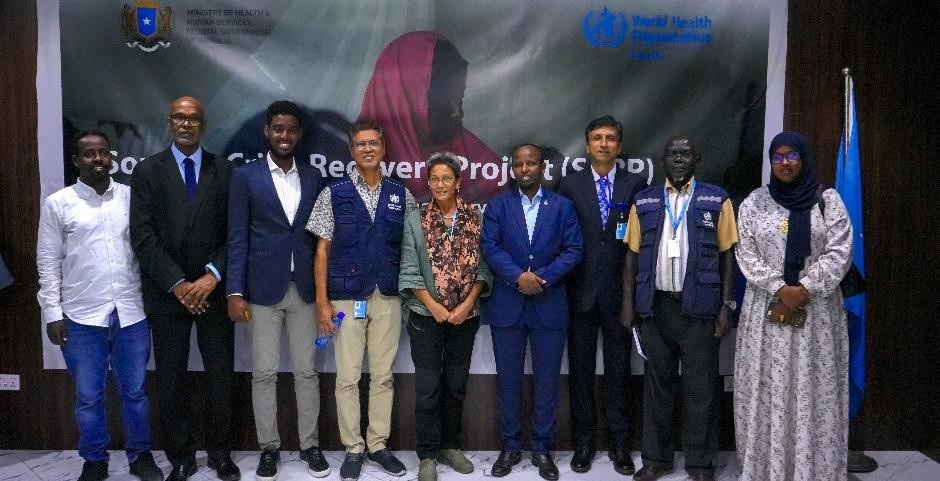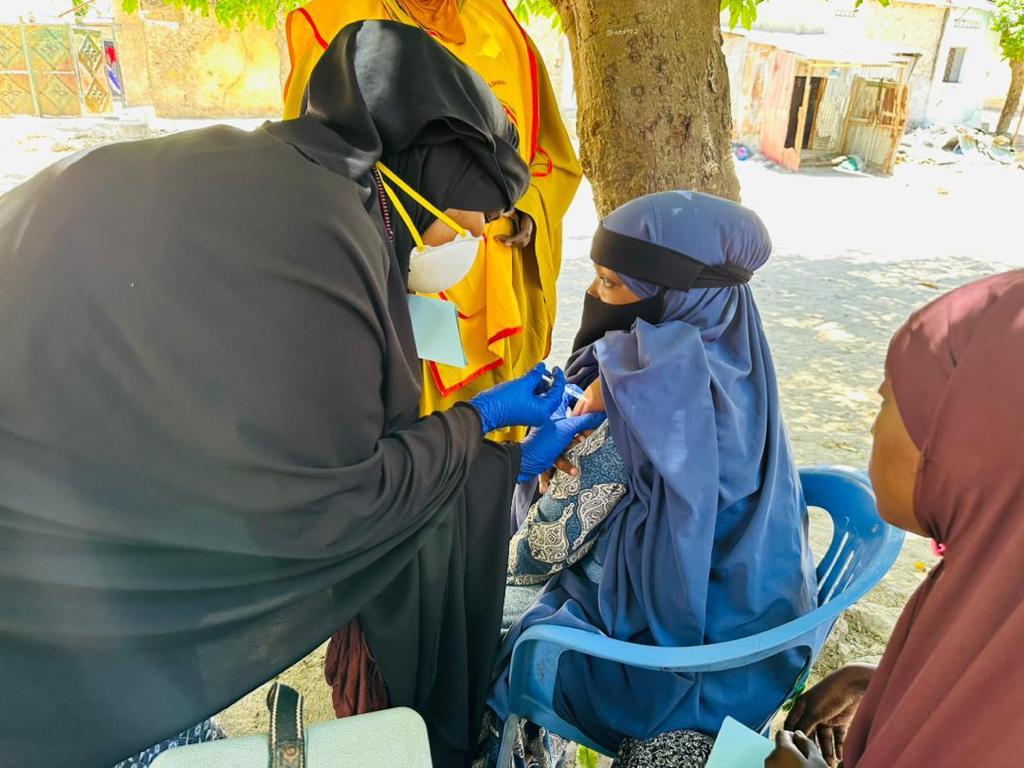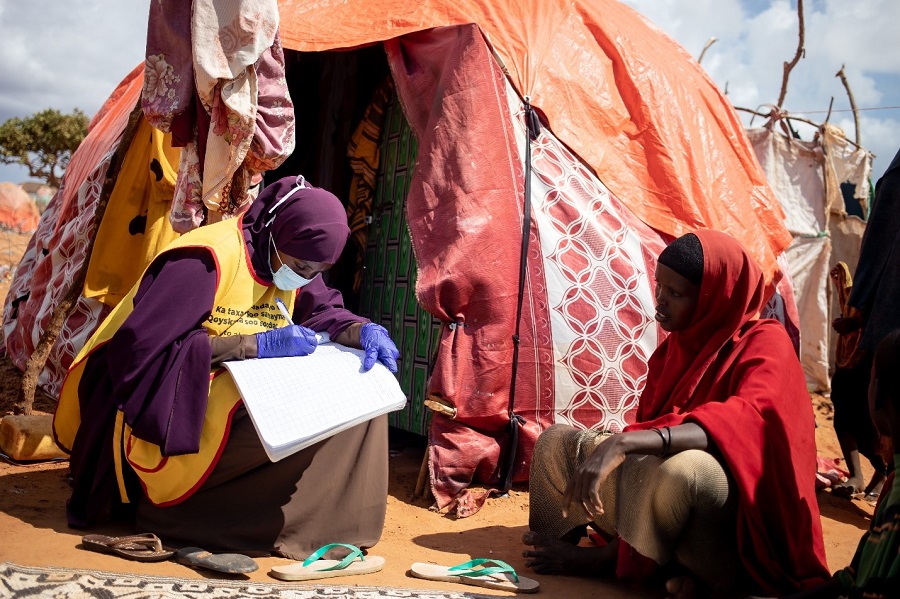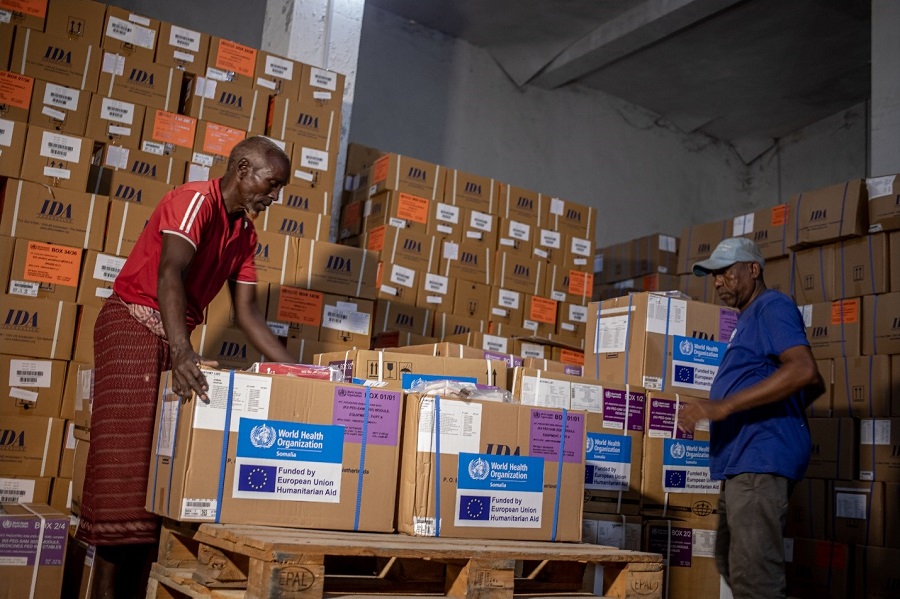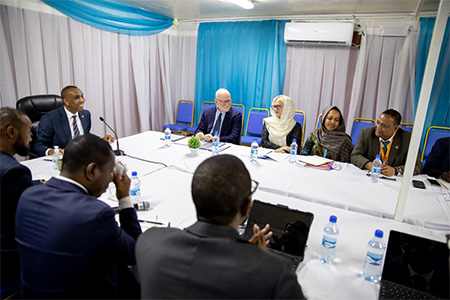 H.E the Prime Minister of Somalia, Mr. Hamza Abdi Barre chairs a high-level consultative meeting with BMGF, WHO and UNICEF on 12 October 2023. Photo credit: WHO Somalia/I.Taxta19 October 2023, Mogadishu, Somalia – High-level political support to stop poliomyelitis, boost immunity to other vaccine-preventable diseases and strengthen health systems in Somalia has been renewed and reinforced. This follows a series of meetings between the Prime Minister of the Federal Government of Somalia, His Excellency Mr Hamza Abdi Barre; representatives of the World Health Organization (WHO), United Nations Children’s Fund (UNICEF) and United Nations Population Fund (UNFPA); and a delegation from the Bill & Melinda Gates Foundation led by Dr Chris Elias, President of the Global Development Division. Ms Etleva Kadilli, UNICEF Regional Director for Eastern and Southern Africa, also joined the discussions.
H.E the Prime Minister of Somalia, Mr. Hamza Abdi Barre chairs a high-level consultative meeting with BMGF, WHO and UNICEF on 12 October 2023. Photo credit: WHO Somalia/I.Taxta19 October 2023, Mogadishu, Somalia – High-level political support to stop poliomyelitis, boost immunity to other vaccine-preventable diseases and strengthen health systems in Somalia has been renewed and reinforced. This follows a series of meetings between the Prime Minister of the Federal Government of Somalia, His Excellency Mr Hamza Abdi Barre; representatives of the World Health Organization (WHO), United Nations Children’s Fund (UNICEF) and United Nations Population Fund (UNFPA); and a delegation from the Bill & Melinda Gates Foundation led by Dr Chris Elias, President of the Global Development Division. Ms Etleva Kadilli, UNICEF Regional Director for Eastern and Southern Africa, also joined the discussions.
Dr Chris Elias, who is also Chair of the Global Polio Eradication Initiative (GPEI) Polio Oversight Board, and polio team members took part in a half-day technical consultation with the Federal Ministry of Health. The aim was to review progress, assess barriers and determine how to advance the march towards a polio-free world.
Under the leadership of President Hassan Sheikh Mohamud of Somalia, the Prime Minister remains strongly committed to efforts that protect Somalia’s children from outbreaks of polio, measles and other vaccine-preventable diseases and that ensure increased outreach across the country to vaccinate mothers and zero-dose children under the Expanded Programme on Immunization.
While extending appreciation for the work and commitment of the Bill & Melinda Gates Foundation, WHO, UNICEF and UNFPA in strengthening immunization, the Prime Minister called upon the Foundation and the health partners “to extend support beyond polio eradication, especially in the area of finding durable solutions to break the cycle of chronic humanitarian emergencies and resulting food crisis.” H.E. Mr Hamza Abdi Barre further urged the organizations to extend their support in the areas of “climate change adaptation, food security and human capital development.” He added: “Such a comprehensive approach will strengthen health systems in a way that improves health and well-being of Somalis.”
Somalia is facing one of the world’s longest running outbreaks of circulating vaccine-derived poliovirus type 2. Since the outbreak began in 2017, the virus has paralysed 32 children in the country and spread to Ethiopia and Kenya. Ending this outbreak is a priority for Somalia and its partners, including GPEI, the core partners of which include WHO, UNICEF, the Bill & Melinda Gates Foundation, Rotary International and Gavi, the Vaccine Alliance.
“I would like to congratulate the Government of Somalia and our partners for the progress towards stopping polio, commitment to introducing pneumococcal and rotavirus vaccines, and continued commitment to control cholera,” said Dr Chris Elias. “The Polio Oversight Board looks forward to continued high-level government leadership to end polio and emphasizes the importance of taking an integrated, whole-of-government approach to address climate-induced health emergencies, including polio outbreaks.”
Both WHO and UNICEF reiterated their commitment to stand shoulder to shoulder with the Government of Somalia and their fellow GPEI partners, and to deliver on-the-ground programmatic support that will yield results.
“Over the past year, my team and I have been part of the implementation of the Somalia Emergency Action Plan (SEAP) and we have seen what is possible when a critical review of programming is followed by renewed collaboration and support from all stakeholders,” said Dr Mamunur Rahman Malik, WHO Representative to Somalia. “We’re now implementing SEAP II, and I am confident that our efforts, led by the Government of Somalia and dedicated health workers at all levels, will deliver real improvements in health outcomes for Somalia’s children.”
“So far this year, the Government, WHO, UNICEF and partners have reached an estimated 4 million children with at least 2 doses of the polio vaccine in an effort to eradicate poliomyelitis from Somalia,” said Ms Wafaa Saeed, UNICEF Representative in Somalia. “With the El Niño effect increasing the rains and severe flooding, disease outbreak is imminent. Getting children vaccinated is the surest way to protect them from life-threatening and debilitating childhood diseases. Vaccines are safe, effective and free. We are thankful for this partnership and the support from donors that enables us to aim to reach every child.”
Media contacts
Fouzia Bano, Communications Officer, WHO Somalia
Email:
هذا البريد محمى من المتطفلين. تحتاج إلى تشغيل الجافا سكريبت لمشاهدته.
Lisa Hill, Communications Specialist, UNICEF Somalia
Mobile: +25 26 13 64 26 23
Email:
هذا البريد محمى من المتطفلين. تحتاج إلى تشغيل الجافا سكريبت لمشاهدته.
Related links





